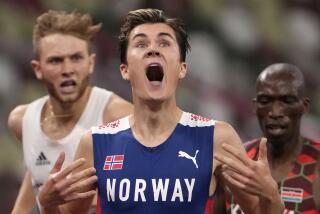Lillehammer ‘94: 16 Days of Glory
- Share via
NEW YORK — It takes nearly one hour for Bud Greenspan’s “Lillehammer ‘94: 16 Days of Glory” to get glorious. When it does, hardly anyone can keep a dry eye.
Greenspan, who has chronicled the Olympics for 40 years, put together a two-part film memory of the Lillehammer Games. The first portion will air Sunday night on The Disney Channel, with the second part scheduled for next Feb. 12.
The first two hours are dedicated to ski jumping, figure skating, cross-country skiing and speed skating. More specifically, the spotlight is turned on gold medalists Jens Weissflog and Espen Bredesen in the opening segment, followed by Oksana Baiul, then Manuela Di Centa and Lyubov Egorova.
But the film doesn’t really get moving until the focus turns to Dan Jansen.
“His emotion, his honesty convinced me to pursue his story in depth,” said Greenspan, who at first was reluctant to make Jansen’s saga a central part of the film. “He was so real, so expressive, that I realized I had to tell his story--through his eyes. He tells it so poignantly, so beautifully.”
Jansen’s story of repeated Olympic disappointment and related tragedy finally leading to triumph is as moving in “16 Days of Glory” as it was when it was winning his gold medal. Wisely, Greenspan tells the entire story, going back to 1984 at Sarajevo, when Jansen was a surprise fourth after expecting nothing more than a top 15 finish.
In 1988, of course, Jansen fell twice as a favorite, but with the most valid of excuses: His sister, Jane, died of leukemia the morning of his first Olympic race at Calgary. The film allows Jansen’s words and actions to tell the story.
Four years later, at Albertville, Jansen was victimized by slow tracks and, perhaps, being over-prepared. So he came to Lillehammer, his final Olympics, as one of the biggest busts in Winter Olympics history.
And then he failed again, finishing eighth in the 500, a race he had dominated during the World Cup season.
“This was my race,” he said.
Greenspan’s cameras often focus on Jansen’s wife, Robin, and his daughter, Jane, named after his sister. Robin provides an insightful analysis of Jansen’s 500 race, as well as relating her husband’s thoughts through four Olympics.
Dan Jansen then admits his fear of the 1,000 and relates how a sports psychologist helped him overcome it. As for a gold medal, however, “I sort of was prepared that it just wasn’t going to happen.”
When it did, America celebrated, and “16 Days of Glory” captures the emotions superbly, particularly when Jansen reflects on his past from the medals podium during the playing of the “Star Spangled Banner.”
He narrates his thoughts at that moment: “My whole career, to my family, Robin, even to my daughter, Jane,” he said. “And to my sister, Jane, very much so.”
Then Jansen looks up and salutes his sister before taking the victory lap with baby Jane in his arms.
Unfortunately, much of Greenspan’s film doesn’t come close to that level of drama and emotion. The cross-country segment featuring Di Centa of Italy and Egorova of Russia is too long. The footage of the ski jumping is spectacular, but the interviews with Weissflog and Bredesen fall flat.
To his credit, Greenspan focused on Baiul rather than the Nancy Kerrigan-Tonya Harding mess in the figure skating.
“She was the real story of the figure skating,” he said of the Ukrainian orphan, who won the gold medal at 16. “Harding and Kerrigan was not an inspirational story. It had nothing to do with the beauty and the spirit of the competition. It was ludicrous that all people talked about was Tonya and Nancy.”
Unfortunately, there is little inspired storytelling in the segment on Baiul, or the other three. But the Jansen stuff makes up for it.
The second part of “16 Hours of Glory” will focus on skaters Bonnie Blair and Johann Olav Koss, skiers Alberto Tomba and Vladimir Smirnoff, bobsledders Wolfgang Hoppe and Prince Albert of Monaco and the thrilling men’s 4x10 kilometer cross-country relay race.
More to Read
Go beyond the scoreboard
Get the latest on L.A.'s teams in the daily Sports Report newsletter.
You may occasionally receive promotional content from the Los Angeles Times.






